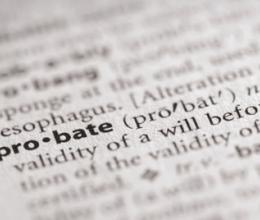For the purposes of this summary, we have assumed that the value or nature of the deceased’s estate is such that a Grant of Probate (or equivalent) will be needed.
The first step
Ideally, the deceased will have left a Will that is both valid and up-to-date. The first step is therefore to try and locate the original document or, failing that, a photocopy. While all that follows can be dealt with after the funeral, the fact that the Will may contain instructions as to burial, cremation etc. means that this search should be conducted as soon as possible.
No Will?
A properly prepared Will names as Executors those who the deceased wishes to deal with their assets and liabilities. In the absence of a valid Will it is up to those with an interest in the Estate to apply for the role of Administrator. The functions are not dissimilar to those of an Executor but, in the absence of a Will, the distribution of the Estate by an Administrator will be governed by the statutory rules of intestacy.
Even if you are unsure at first whether there is a Will in existence or who is to be an Administrator, it is common sense that family members or others likely to benefit from the Estate should secure any valuable possessions and any empty property.
Applying for Probate
With the exception of those held in joint names, the assets of the deceased will generally be frozen until a Grant of Probate (in the case of Executors) or Letters of Administration (in the case of Administrators) has been obtained from the Probate Registry. The Grant gives the Executors or Administrators legal authority to deal with those assets. It may be applied for personally or via an appropriately authorised individual (typically an accountant or solicitor). Either way, however, it is first necessary to gather together details of assets, liabilities and relevant expenses so that the necessary forms can be completed.
What do I do once I have the Grant?
Those appointed as Executors or Administrators –‘the personal representatives’ - are responsible for:
- gathering together and protecting the assets of the deceased
- calling in any debts and settling any liabilities payable from the Estate
- managing those assets and, if appropriate, selling them
- dealing with the deceased’s tax liabilities to date of death
- paying Inheritance Tax and tax liabilities for the administration period, and
- distributing the net assets remaining in accordance with the deceased’s wishes (or rules of intestacy).
Do I need help?
An Executor or Administrator is personally liable for his or her actions and it is essential that the administration of the Estate is dealt with properly. There can be significant amounts of tax due (either Inheritance Tax or, in some cases, tax in respect of income or gains that the deceased failed to declare) with a risk of penalties for errors and omissions. In addition, the paperwork involved can be substantial and the computations complex, and there can be issues regarding the interpretation of the Will. There may also be tax planning opportunities for the beneficiaries. All of this comes at a time when you will be dealing with the loss of someone close to you and may find it difficult to focus on financial matters and paperwork generally.
There is no requirement to appoint a professional person, a firm of solicitors, or a bank as an Executor. There is similarly no requirement for Executors to engage a professional to assist them. However, anyone who finds themselves in this position should give careful thought as to whether they might benefit from some professional guidance, whether that is simply at the level of a ‘helping hand’ or whether it involves engaging someone else to deal with the whole process.
The next steps
Our offices in London, Letchworth, Kent, York and Abingdon are licenced to carry out non-contentious probate work. Advisers in those offices can talk you through this process in more detail, explain to you the ways in which they can assist, and tell you how much that is likely to cost. Those same advisers can assist you with Inheritance Tax and more general planning, the structuring of your Will, and your choice of Executors.



